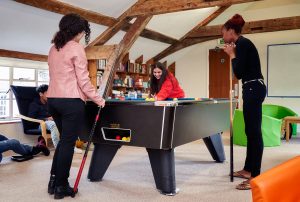
HIEDA/SACPA – Level 3 Certificate: Safeguarding for School Nurses and School Nurse DSLs
26 June 2025 @ 9:30 am - 4:30 pm


- Date: June 26, 2025
- Time: 09:30 – 16:30
- Cost: HIEDA/SACPA Member Rate: £175, Non-member Rate: £350*
- Audience: All clinical staff working with children, young people and/or their parents/ carers and/or any adult who could potentially contribute to assessing, planning, intervening and/ or evaluating the needs of a child or young person and/or parenting capacity.
- Platform: Zoom (online) – seminar
Course Outline:
This one-day certificate programme is based upon the learning outcomes for level 3 health workers detailed within the most recent Intercollegiate document 2019. Content also links with Annex C of Keeping Children Safe in Education 2024 detailing roles and responsibilities of Designated Safeguarding Leads and Deputy Designated Safeguarding Leads.
Case study and practical learning examples are based on specific clinical practice examples and dilemmas and reference to specialist health evidence-base relevant to the role of the school nurse. This certificate programme is suitable for school nurses working in a range of education settings including state, independent, international, and boarding contexts.
The programme is co-facilitated by health and safeguarding practitioners and has been specifically developed to certificate school nurses for level 3 safeguarding for clinicians as well as providing certification for those school nurses who also carry out the role of Designated or Deputy Designated Safeguarding Lead in education settings.
Training topics will include:
- Leading safeguarding in health: the roles and responsibilities of the school nurse and designated safeguarding lead
- Refresh of legal and regulatory frameworks, principles, and definitions
- Safer organisations and a culture of listening to children
- Vulnerable groups and the impact of trauma, SEND and vulnerability
- Refresh of traditional safeguarding signs and indicators and overview of specific contemporary safeguarding concerns such as e-safety, FGM, domestic abuse, child-on-child, exploitation etc.
- Multi-agency working with early help and statutory services
- Keeping records and information sharing
Learning outcomes:
- To be able to identify, drawing on professional and clinical expertise, possible signs of sexual, physical, or emotional abuse, or neglect, including domestic abuse, sexual exploitation, grooming and exploitation to support and/or commit acts of terrorism (known as radicalisation), FGM, modern slavery, gang and electronic media abuse using child and family-focused approaches.
- To understand what constitutes child maltreatment including the effects of carer/ parental behaviour on children and young people.
- To know how to undertake, where appropriate, a risk and harm assessment.
- To know how to communicate effectively with children and young people, and to know how to ensure that they have the opportunity to participate in decisions affecting them as appropriate to their age and ability.
- To know how to contribute to, and make considered judgements about how to act in order to safeguard/protect a child or young person, including escalation as part of this process.
- To know how to contribute to, formulate and communicate effective management plans for children and young people who have been maltreated within a multidisciplinary approach and as related to role.
- To be able to demonstrate an understanding of the issues surrounding misdiagnosis in safeguarding/child protection.
- To know how to appropriately contribute to inter-agency assessments by gathering and sharing information, documenting concerns appropriately for safeguarding/ child protection and legal purposes, seeking professional guidance in report writing where required.
- To know how to participate in and chair peer review and multidisciplinary meetings as required
- To be able to identify risk to the unborn child in the antenatal period as appropriate to role.
- To know how to assess training requirements and contribute to departmental updates where relevant to role. This can be undertaken in various ways such as through audit, case discussion, peer review and supervision and as a component of refresher training.
- To know how to apply the lessons learnt from audit and serious case reviews, case management reviews and significant case reviews to improve practice.
- To know, as per role, how to advise others on appropriate information sharing
- To know how to obtain support and help in situations where there are problems requiring further expertise and experience.
Speakers:

Claire Dan, Director of Safeguarding BSA Group and Director, Sacpa
Claire is Director of Safeguarding and Director, Sacpa and leads on the provision of safeguarding advice and support to members and the development and delivery of CPD and safeguarding consultancy services. Claire is a safeguarding specialist and leader with a background in education welfare, youth justice, and early help contexts which have involved a strong focus on diverse and collaborative partnerships, professional development and supervision of front-line safeguarding colleagues, and leading multi-disciplinary teams and projects. Between 2006 and 2013 Claire was involved with Luton Safeguarding Children Board as a lead multi-agency safeguarding trainer, developing and delivering single and multi-agency safeguarding training, and since 2013 has delivered pieces of bespoke consultancy work, and providing a range of safeguarding consultancy on a freelance basis.
 Louise Howel, Head of HIEDA
Louise Howel, Head of HIEDA
Louise Howel is a paediatric nurse with experience in children’s A & E, plastics and respiratory care. Health visitor for ten years. Nine years experience in independent school nursing working in a mix of boarding and day school settings. Six years experience as Health centre manager most recently at Wycliffe College.







